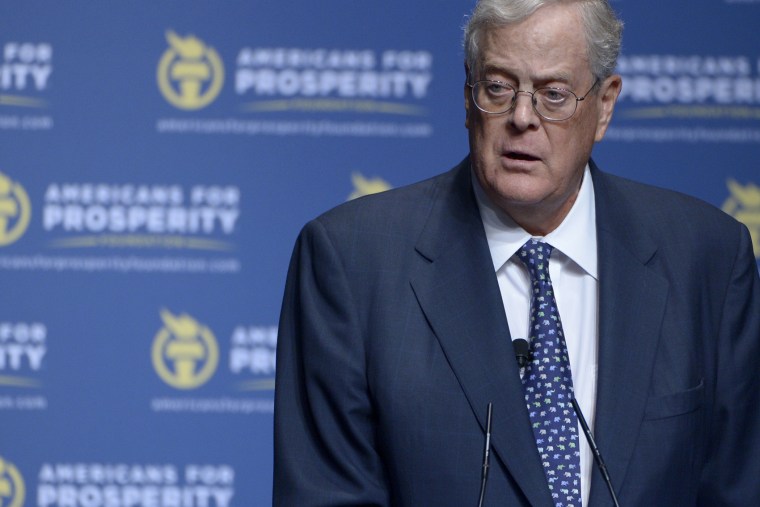The more Charles and David Koch provided the resources for a massive political operation, the more it seemed as if the far-right billionaires were creating a political party of their own. The Kochs had an army of field organizers, blanketed the airwaves with political ads, and even had their own voter lists.
All of this, of course, raises important questions about the role of money in the political process, and just how much influence wealthy interests can wield in a democratic system. But as Yahoo News
reports today, for the Republican National Committee, the Koch brothers' power is raising very different kinds of questions.
The Yahoo News report notes, for example, that in the 2014 election cycle, the RNC and the Kochs' operation struck a deal to share voter data, though the arrangement evaporated once the season came and went. Now, however, the two sides are sharply at odds, creating what one Republican operative described as "
all-out war."
Interviews with more than three dozen people, including top decision-makers in both camps, have revealed that the Kochs' i360 platform for managing voter contacts -- which is viewed by many as a superior, easier-to-use interface than what's on offer from the RNC -- is becoming increasingly popular among Republican campaigns. The RNC is now openly arguing, however, that the Kochs' political operation is trying to control the Republican Party's master voter file, and to gain influence over -- some even say control of -- the GOP.
Katie Walsh, the RNC's chief of staff, told Yahoo News, "I think it's very dangerous and wrong to allow a group of very strong, well-financed individuals who have no accountability to anyone to have control over who gets access to the data when, why and how."
I can appreciate why fights over data may seem like the ultimate in inside-baseball, but this is a fight worth paying close attention to.
Remember, for many modern campaigns, this data is the foundation for any successful endeavor. The more reliable and comprehensive the data, and the easier it is to use, the more effective the targeting, messaging, advertising, and grassroots organizing of any major campaign.
In this case, as one might expect, the Republican National Committee controls the Republican voter file, but the Kochs' operation seems to have discovered that it really doesn't need the Republican National Committee -- the Kochs have their own platform to manage the data, and their own relationships with campaigns that want to make use of the data.
If that's the case, some of you may be wondering why the Republican National Committee is needed at all -- and you wouldn't be the only one. From the Yahoo piece:
The core issue, from Priebus' point of view, is one of loyalty and allegiance. The RNC is a permanent entity, committed to the Republican Party without question. The Koch network is too independent from the party to be trusted with possession of the GOP's most valuable core assets. If the Kochs -- whose political history is steeped more in libertarianism than it is in any loyalty to the Republican Party -- decided next week to use their database to benefit only their massive multinational corporation, they could do so. [...] The Kochs' political arm, Freedom Partners, which oversees i360, views the issue as one of capability. Koch aides -- several of whom used to work at the RNC -- want to win elections, and in their view the RNC has inherent challenges to helping the party win. Party committee fundraising is severely limited by federal election law, while building, maintaining and enriching a database is expensive.
The other angle to keep in mind is just how striking it is to see Republican officials discover their heretofore non-existent concerns about outside money and the political process. The RNC's Katie Walsh didn't even rely on anonymity -- she straight up told Yahoo News, on the record, that she believes it's "dangerous" to extend too much power to "well-financed individuals who have no accountability to anyone."
Ya don't say. We might want to think twice before turning over parts of the democratic process to unaccountable, wealthy players with their own agenda? I've heard similar concerns for many years, but I don't recall them ever coming from RNC officials.
